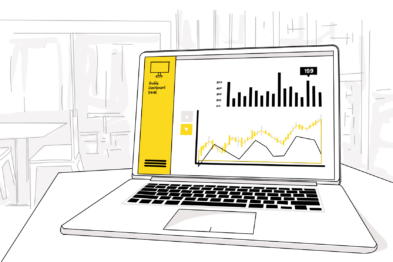In the rapidly evolving retail landscape, the ability to harness and leverage data effectively has become a cornerstone of success. This transformation from raw data to actionable insights is not just a technological challenge but a strategic imperative. In a recent Rethink Retail Podcast, Clement Galeron, Client Director at Memory within VusionGroup, discusses the future of retail as data-driven, with a unique perspective on how to navigate this new terrain.
The Era of Retail Intelligence
Retail intelligence is the convergence of data, analytics, and actionable insights to drive retail strategy. But what does this mean in practical terms? At its core, retail intelligence involves gathering, analyzing, and interpreting data from different sources to make informed decisions that drive sales, increase profitability, and enhance customer satisfaction.
However, the journey from data to strategy is fraught with challenges. Data silos, inaccurate or incomplete data, overwhelming volumes of data, and a lack of analytical capabilities within retail organizations are just a few of the obstacles. Addressing these challenges is not merely about deploying advanced tools but requires a nuanced approach combining technology with human expertise.
Bridging the Gap: Memory’s Approach
VusionGroup’s retail intelligence software platform, Memory, embodies this methodology by delivering a comprehensive digital solution that consolidates transactional, shopper, and internal data. This integration empowers retailers and consumer packaged goods (CPG) companies to make more informed business decisions. Leveraging AI, Memory offers predictive tools to enhance category management and optimize supply chains. Galeron underscores the critical progression from data to insights to action, stating, “At Memory, we provide an end-to-end digital platform that integrates various data types—transactional, shopper, and internal—to help retailers and CPGs make better business decisions.” This holistic approach ensures that data is not just collected but also analyzed and utilized effectively.
One of the standout aspects of Memory’s approach is the ability to react swiftly to emerging trends and challenges. During the pandemic, for example, Memory introduced tools to monitor product holding and reduce unnecessary store visits, showcasing the platform’s ability to swiftly adapt to urgent market needs. “We collaborated with VusionGroup to create a new module addressing supply chain issues such as out-of-stock and out-of-shelf situations,” adds Galeron.
The Human Element in Data Strategy
While technology is a critical enabler, the human element cannot be overlooked. Resistance to change, cultural barriers, and a lack of clear objectives are significant hurdles that need to be addressed. Successful data transformation requires not only technical proficiency but also effective change management and leadership.
Galeron highlights the importance of simplifying the approach to AI and data analytics, “We love data, so we try to make it simple and give the right data, the right KPI.” By focusing on clear objectives and iterative improvements, retailers can avoid being overwhelmed by the complexity of these technologies.
From Insights to Strategy
A critical aspect of retail intelligence is the translation of data insights into concrete strategies. Galeron outlines several challenges retailers must overcome, including resistance to change and the need for clear objectives. “Addressing these challenges is crucial for retailers to leverage data into actionable insights and business growth,” he notes.
Memory’s approach involves understanding the specific use cases of clients and providing tailored solutions that integrate seamlessly into their operations. “We’ve developed a highly advanced solution. We gather data directly from retailers, clean it, enrich it, and then feed it into our tools,” Galeron emphasizes, underscoring the importance of actionable and relevant insights.
Ethical Considerations and Data Privacy
As we move towards more sophisticated retail intelligence, ethical considerations and data privacy become paramount. The use of AI and data analytics must be balanced with a commitment to ethical data use and robust privacy protections. In Europe, GDPR provides a framework for data privacy that Memory adheres to, ensuring that all shopper data is pseudonymized and handled with care.
Looking Ahead: The Future of Retail Intelligence
The future of retail intelligence is promising and transformative. Advances in technology will enable even more sophisticated analytics, real-time decision-making, and integration with emerging technologies like augmented reality (AR), virtual reality (VR), and the Internet of Things (IoT). These developments will further enhance the customer experience and drive business growth.
However, the real potential lies in the proactive use of these technologies. Traditional retail intelligence platforms will evolve to enable direct interactions through large language models like ChatGPT, enhancing support and improving alerting capabilities.
Conclusion
As we rethink retail, it is clear that the journey from data to action is complex but essential. Solutions like Memory are leading the way by combining technological innovation with human expertise, addressing the technical and cultural challenges of data transformation. The future of retail will be shaped by those who can navigate this terrain effectively, turning data into actionable insights and strategic decisions that drive success.
For those ready to embark on this journey, the key is to start simple, focus on specific use cases, and continuously iterate and improve. The future of retail intelligence is here, and it is both an exciting and challenging frontier.




